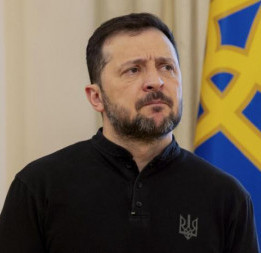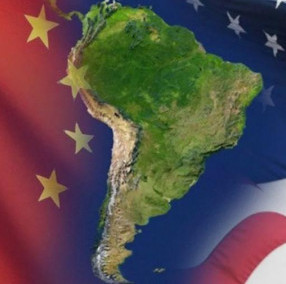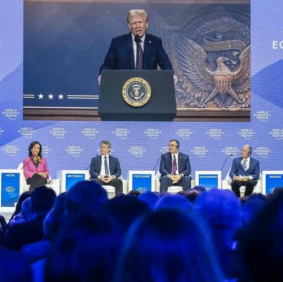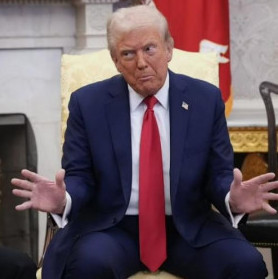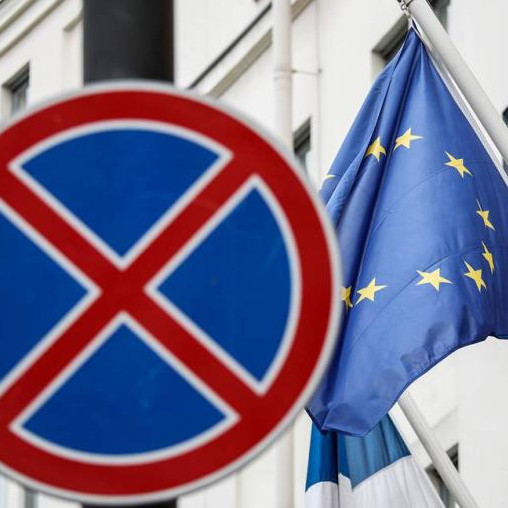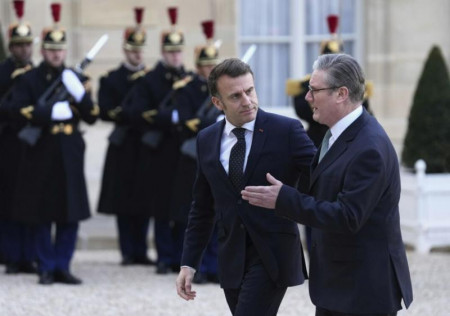
The European "mini-summit" of the EU convened by French President Macron has failed to provide an answer to how Europe should behave amid the US and Russia’s decision to leave the Old World out of dialogue on Ukraine. British Prime Minister Keir Starmer's calls to send a so-called "peacekeeping contingent" comprising European military personnel to Ukraine have not brought those present to a consensus. Moreover, Western news agencies have branded meeting results a "split" among European countries over the "peacekeeper" issue.
It took the leaders of France, Germany, Italy, Great Britain, Poland, Spain, the Netherlands, Denmark, the European Union and NATO about two hours behind closed doors at the Elysee Palace in Paris to discuss the puzzling intimate question: what is to be done?
Europe could not help but gather after having been "humiliated and crushed" by the Americans within a few days actually. The "mini-summit" in Paris was a kind of attempt to save the face of Europe, whom Washington explicitly told that nothing depended on it at all. And Europe thus tried to snap back.
Let's recall what preceded it. In the last few days, Europe, as defined by the Reuters news agency, has found itself in a dangerous position. First, President Trump called President Putin with a proposal to start peace talks on Ukraine, without notifying the latter or Europe. Second, US Special Envoy for Ukraine Keith Kellogg made it clear that America saw no role for Europe in the bilateral US-Russian peace talks.
And third, US Vice President J.D. Vance attacked European countries with merciless criticism when speaking at the Munich Conference. He said censorship was looming over Europe and urged Western governments to take due regard of their citizens’ viewpoint, rather than treating them like "trained animals" or cogs in global economy. According to him, the main threat to Europe does not come from Russia or China, it lies within Europe itself. As examples, J.D. Vance cited the cancellation of election results in Romania and the risk of a repeat of this scenario in Germany, clearly pointing to popularity of the local AfD party.
The Munich Security Conference has been the last straw to overwhelm the Europeans’ sense of "national pride". Its results have caused shock and deep depression with the European bureaucrats and America’s NATO allies in Europe. Conference head Christoph Heusgen even burst into tears when closing the venue, and called it a "nightmare" for Europe on the ZDF TV channel. "This year's Munich Conference has in a sense become Europe’s nightmare. <...> At the same time, it was very clarifying," Heusgen said.
So, in order to somehow smooth out the shock and save face, the Europeans led by French President Macron gathered in Paris for their "mini-summit." "European leaders discuss how to respond to Trump and Putin and what to propose as their own plan for Ukraine. Oh, to be a fly on the wall!" — this is how Britain’s The Guardian sarcastically though precisely defined the Paris venue in advance. The "fly on the wall" is a symbol of Europeans’ role, or rather, the lack of it in the upcoming dialogue between the leaders of Russia and the United States on ways to resolve the conflict in Ukraine.
Meanwhile, the Paris meeting was not just a formal thing meant to preserve the European face and demonstrate "independence." The "mini-summit" showed where the threat to the entire continent really comes from, and has already divided Europe itself into parts, revealing the most active supporters of war to the last Ukrainian.
Prior to the event, British Prime Minister Keir Starmer said the United Kingdom could allocate a contingent to deploy in Ukraine as a guarantee against future escalation threats. And it seemed to imply a "peacekeeping" one. Meanwhile, everyone realizes that the term is just a camouflage to cover up Britain's direct involvement in the conflict.
Official London was not alone in its intent to test the strength of its soldiers in Ukraine. Starmer's statement was supposed to send a signal to other countries inside London’s sphere of influence. Swedish PM Ulf Kristersson announced readiness to send troops to Ukraine, too. Earlier, French President Macron spoke about this as well.
Moreover, right on the Munich Conference’s opening day (February 14), the leaders of Nordic and Baltic countries — Denmark, Estonia, Finland, Iceland, Latvia, Lithuania, Norway, Sweden — issued a joint statement on "fully and unconditionally supporting Ukraine." "Ukraine must be able to prevail against Russia's war of aggression to ensure a just and lasting peace," the document read. "Our priority now is to strengthen Ukraine. Our countries are some of the largest per capita contributors of military assistance to Ukraine." In other words, there was coordinated sabotage of Trump's peaceful intentions by the United Kingdom and a group of aforementioned states.
Meanwhile, even the scarcely Russophilic Reuters news agency has cited the general opinion of those opposing deployment of European "peacekeepers" in Ukraine: "A peacekeeping force would not only raise the risk of a direct confrontation with Russia… but also stretch European armies, whose arsenals have been depleted by supplying Ukraine and decades of relative peace."
Starmer's insistence on introducing "peacekeepers" has split the Paris talks participants. German Chancellor Olaf Scholz said "there could be no peace deal without Ukraine's consent," while calling talk of a German peacekeeping mission in Ukraine "highly inappropriate" without a peace deal in hand.
Italian Prime Minister Giorgia Meloni was also opposed the "peacemaking" plan. "It was useful to discuss today the various hypotheses on the table. The one that foresees the deployment of European soldiers in Ukraine seems to me to be the most complex and perhaps the least effective, and on this too I voiced Italy's doubts," she said.
Danish Prime Minister Mette Frederiksen made some streamlined and incomprehensible statements on being open to debate on troops deployment and the need for Europe to step up support for Ukraine while increasing domestic defense spending.
Polish Prime Minister Donald Tusk arrived in Paris with a previously known negative opinion about the "peacekeepers." Earlier, he said Poland would not send its soldiers to Ukraine, although it would keep providing military support to Kiev.
London may have very specific reasons to get engaged and tug other Europeans along with it. Just a reminder: London and Kiev have signed a 100-year cooperation agreement. The document’s text is not known. However, Kiev may have committed itself to give all or part of its fossil deposits to the Britons in exchange for their continued support.
Now let's recall that Zelensky refused to sign the agreement on rare earth metals with the United States. That is, he cannot promise Trump what he could have already promised to Starmer. That's why the British Prime Minister is dragging his army and the Europeans (particularly Scandinavians and Balts) into war in Ukraine. Starmer's mission is to stake out territories with mineral deposits that may become Russia’s for Britain. Starmer is in a hurry for one simple reason: he wants to keep as much land as possible for Kiev before the AFU crumble or the Russians march towards Lvov. Actually, this underlies Trump's haste as well as he is still eager to grab part of the Ukrainian pie.
So, Starmer's provocative call for European leaders to undertake a de facto direct armed invasion of Ukraine was drowned in discussions among those who loathe getting involved in a war with Russia. Starmer looked lost, his comments on the outcome of the "mini-summit" sounded foolish. "There must be a US security commitment for European countries to send postwar peacekeeping forces to Ukraine," he said in the follow-up. And yet, his implications remained unapprehended. Also, Starmer said it was too early to say how many British troops he would be willing to deploy.
Interestingly, Prime Minister of Slovakia Robert Fico has noted the Paris negotiations’ legal inconsistency, saying that EU officials do not have a mandate to negotiate Europe's role in a Ukrainian ceasefire. Fico said the venue was hardly about the EU and proved to be "undermining confidence" within the bloc.
The European "mini-summit" has eloquently demonstrated that collective West no longer exists. The new US leadership makes no secret of ignoring Europe’s opinion. The situation has vividly exposed lack of unity and sovereignty in the Old World. Euro-Atlantic solidarity has bitten the dust. Without hegemon’s support and "guiding hand", the European Union and NATO have become card-castles about to collapse. All of this testifies to NATO’s shameful defeat in its war against Russia in Ukraine. And British attempts to prolong the conflict speak to their painful unwillingness to admit hard facts.
